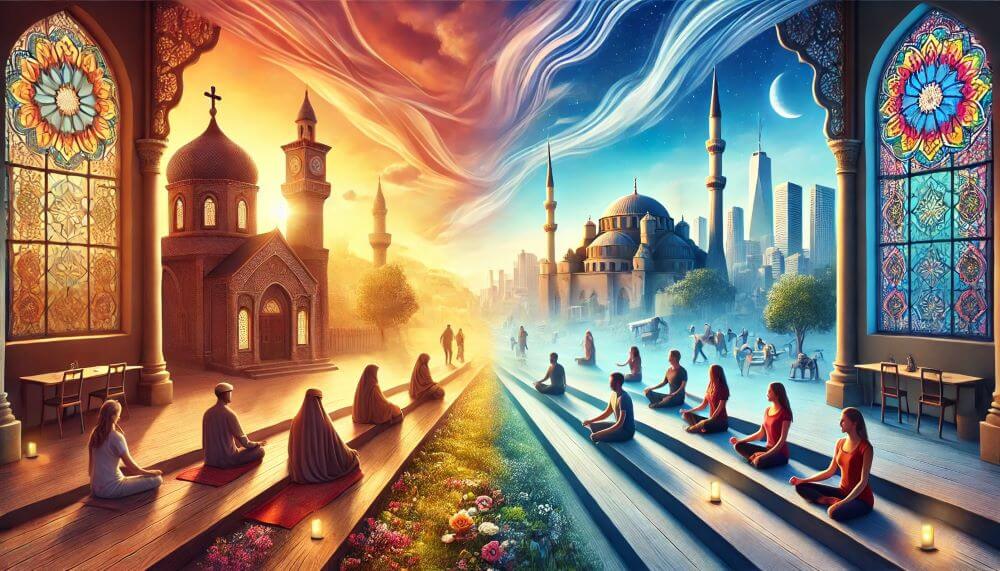Do people choose their religion, or is religion a geographical accident?
I’m from Colombia, a country colonized by Catholic Spaniards, and, as expected, my family’s religion is Catholicism.
My friend Rania is from Morocco, a country conquered by an Islamic army in the 8th century. Unsurprisingly, her religion is Islam.
Most people don’t actively choose their religion. Instead, it’s often passed down from one generation to the next, accepted without much question. As a child, my mother baptized me without considering that I might one day renounce her religion. While everyone else in my family remains practicing Catholics, I’ve chosen a different path.
In North America, however, many people are beginning to question their parents’ religious legacy, choosing their own beliefs—or none at all.
The Rise of the “Nones”
The “Nones”—those who identify as religiously unaffiliated—are rapidly growing. In the early 2000s, about 16% of U.S. adults were unaffiliated. By the end of 2024, that figure has risen to around 30%.
Simultaneously, mainline Protestant denominations and Catholicism have seen steady declines in membership and attendance. Many Millennials and Gen Zers now describe themselves as “spiritual but not religious.”
Many younger generations, such as Millennials and Gen Z, describe themselves as “spiritual but not religious.”
But if millions are abandoning religion, what are they replacing it with?
Religion as Community and Identity
For my mother, church is more than a place of worship. She attends services at least five times a week, finding community, belonging, and purpose. Religion isn’t just her moral compass—it’s also her social life.
I, on the other hand, broke away from this pattern and chose not to follow any religion. I don’t need religious beliefs to have a moral compass. I can distinguish between good and evil without adhering to a particular god.
To find a sense of community, I’ve built my own through my dance group, Toastmasters club, business network, and relationships with neighbors.
From my point of view, religions do more harm than good
From my perspective, religions often do more harm than good.
Historically, religious beliefs have been the root cause of many wars, from the Christian Crusades to today’s scandals like the Catholic Church’s child abuse cases.
In some parts of the world, religion remains stuck in the past, perpetuating barbaric practices. For instance:
- In parts of Iran, Somalia, and Afghanistan, women can be stoned to death for infidelity.
- In 2023, Mahsa Amini, a 22-year-old Iranian woman, was killed by police for not wearing a hijab properly.
- In Iraq, girls are being married at 9 years old.
- In Afghanistan, women have been stripped of nearly every human right.
What’s Replacing Religion?
In the U.S. and Canada, many political movements have become as sacred as religions. Democrats and Republicans, for example, are increasingly entrenched in their beliefs, with some even resorting to violence to impose their views.
Consider the anti-abortion movement, where extreme protesters have committed murders to stop abortions. Similarly, some pro-Palestine sympathizers use violence to promote peace—a stark contradiction.
Meanwhile, cultural issues have become the new battleground. Topics like:
- Transgender women in girls’ sports
- Abortion rights
- Free speech vs. cancel culture
- Immigration and border control
- Education and curriculum
- Diversity, Equity, and Inclusion (DEI) programs
Programs like DEI are designed to reduce racism, yet studies show they sometimes backfire. These initiatives may inadvertently discriminate against one group to benefit another, often creating more tension and resentment than they resolve. If we can’t question such policies without being labeled racist, cruel, sexist, or bigoted, open dialogue becomes impossible.
The Problem with Big Belief Systems
Both religions and ideologies often divide people into “us” and “them.” Even with good intentions, this division frequently leads to conflict.
So, What Should Replace Religion?
Instead of replacing religion with another big idea, we can find meaning in smaller, more personal ways. Focus on human connections, your relationship with family and friends, hobbies, create bonds with your local community, or work.
Not everything needs to be part of a grand, unifying system—and that’s okay. For example, I often volunteer my services as a photographer or as a dance teacher to strengthen the ties with my community. The mother of my business partner, an older lady living her retirement life, has been part of the same social club for over 25 years.
Pursue your passions, whether it’s art or music, or gardening, anything that brings you joy and a sense of accomplishment.
It’s not about rejecting spirituality entirely, it’s about finding it everywhere in everyday life. Shift your focus from all those large rigid systems and look for meaning in our own personal experiences.
Previous opinion posts

 AMERICA’S EMPTY PEWS: CHURCHES CLOSING AT RECORD RATES
AMERICA’S EMPTY PEWS: CHURCHES CLOSING AT RECORD RATES